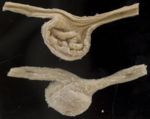Difference between revisions of "Crop - Anatomy and Physiology"
Jump to navigation
Jump to search
m (Text replace - "[[The Gizzard - Anamtomy & Physiology|" to "[[Gizzard - Anatomy & Physiology|") |
|||
| Line 40: | Line 40: | ||
[[Category:Avian Alimentary System - Anatomy & Physiology]] | [[Category:Avian Alimentary System - Anatomy & Physiology]] | ||
| + | [[Category:To Do - A&P]] | ||
Revision as of 13:46, 9 September 2010
Introduction
The crop is a food storage device present in avian species. It is usually used when the muscular stomach (gizzard) is full. The crop also softens food.
It is a useful tool for avian veterinarians and owners for assessing when the bird last ate and it is especially important to ensure young chicks always have full crops. It is also a common site for impactions and surgical entry to remove foreign bodies.
Structure and Function
- Muscular chamber
- Fusiform enlargement of the oesophagus
- Thoracic inlet of ventral wall of oesophagus
- Bulges and lies against the breast muscles
Innervation
- Vagus nerve (CN X)
Species Differences
- Crop small in ducks and geese
- Crop much larger and muscular in seed eating birds
- Pigeons have epithelial cells in their crop sensitive to prolactin which slough when chicks (squabs) hatch producing crop milk
- Owls have no storage facility in their crops, so produce a pellet of indigestible material after every meal
Test yourself with the Avian Alimentary Tract flashcards
Avian Alimentary Tract Flashcards
